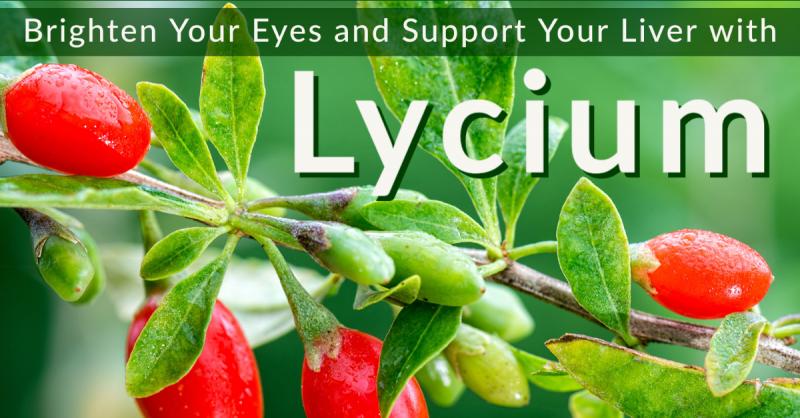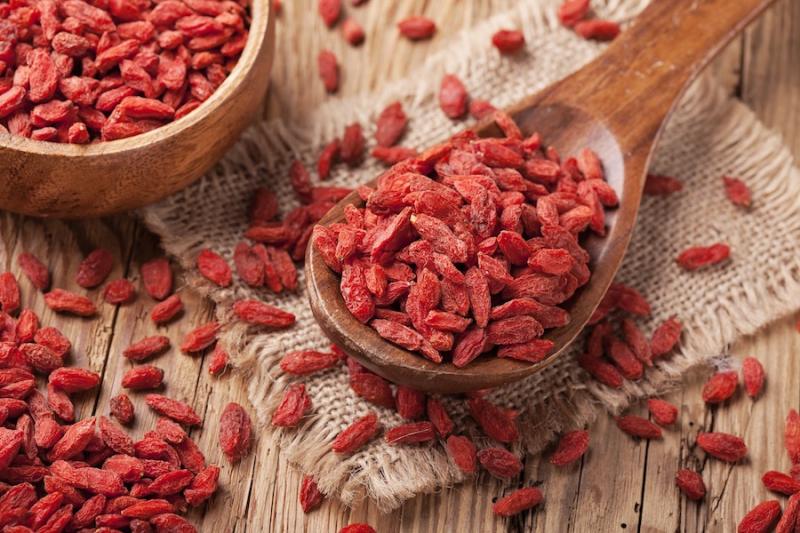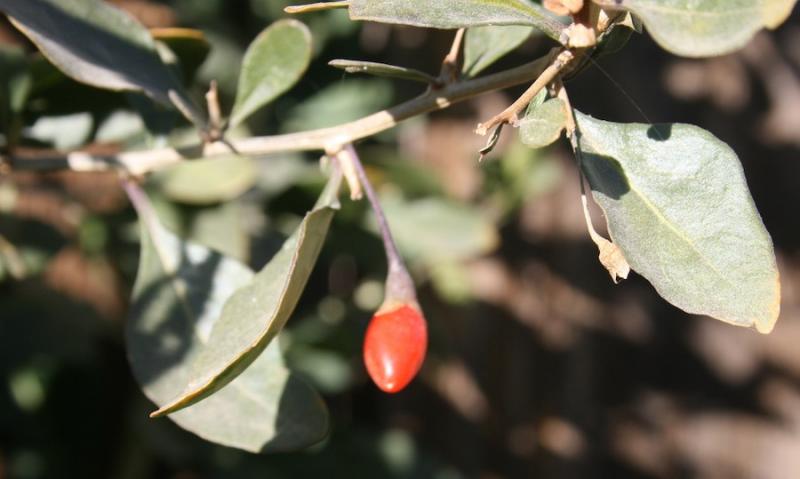 The ancient Chinese saw a correlation between the liver and the eyes. They recognized that sour tasting herbs tonified the liver qi (energy) and also tended to “brighten the eyes,” that is, to aid vision. The herb I’m writing about today, lycium, also known as goji or wolfberry, is one of these herbs. One possible reason for this connection is that the liver and the eyes are the two parts of the body that require the most antioxidant nutrients.
The ancient Chinese saw a correlation between the liver and the eyes. They recognized that sour tasting herbs tonified the liver qi (energy) and also tended to “brighten the eyes,” that is, to aid vision. The herb I’m writing about today, lycium, also known as goji or wolfberry, is one of these herbs. One possible reason for this connection is that the liver and the eyes are the two parts of the body that require the most antioxidant nutrients.
The liver needs antioxidants because it generates free radicals in the process of detoxification, which need to be neutralized. The eyes require large amounts of antioxidants because the light entering them also causes free radical damage if there aren’t antioxidant compounds there to neutralize them. In fact, most major eye problems associated with aging are linked with free radical damage, including macular degeneration, diabetic retinopathy, and cataract formation.
Thus, if the body isn’t getting enough antioxidants, the systems that would be most adversely affected would be the eyes and the liver. The Chinese observed this connection thousands of years before anyone discovered how to explain it.
Traditional Herbal Wisdom
I believe there is a lot that we can learn from traditional herbal wisdom. Just because ancient people didn't know the mechanism behind their observations, they weren’t stupid. In fact, they were very observant and their observations have helped me become more effective in helping people.
Too often I find people dismissing some bit of traditional wisdom because there isn't a paper or a study supporting it. I think this is a mistake. While understanding the why of how something works can enhance the ability to use it, it isn't necessary. Just because someone doesn't know how the electronics in their cell phone work, doesn’t mean they can't use it. Likewise, we don't have to wait for a study to confirm whether an herb works or not when we can try it and observe the results directly.
Antioxidant Compounds in Lycium
 Recent research has been able to better explain why traditional Chinese medicine would use Lycium chinense or L. barbarum berries help the eyes and the liver. This research has shown that they have significant antioxidant activity. The berries contain many antioxidant compounds—polysaccharides with antoxidant effects, significant amounts of beta-carotene (the precursor to vitamin A), a form of vitamin C (2-O-β-D-Glucopyranosyl-L-ascorbic acid) with powerful antioxidant and anticancer properties, flavonoids, and zeaxanthin (a carotenoid that helps protect the eyes). Here’s a link to a study about its biochemistry.
Recent research has been able to better explain why traditional Chinese medicine would use Lycium chinense or L. barbarum berries help the eyes and the liver. This research has shown that they have significant antioxidant activity. The berries contain many antioxidant compounds—polysaccharides with antoxidant effects, significant amounts of beta-carotene (the precursor to vitamin A), a form of vitamin C (2-O-β-D-Glucopyranosyl-L-ascorbic acid) with powerful antioxidant and anticancer properties, flavonoids, and zeaxanthin (a carotenoid that helps protect the eyes). Here’s a link to a study about its biochemistry.
Lycium Energetics
In the herbal energetic system I use, lycium is a cooling and moistening tonic. It can help to bring down fever and soothe ailments where there is excess “heat” or inflammation and a loss of body fluids. It’s been used traditionally to help with nosebleeds, coughs, excessive tears, dizziness or vertigo, and weakness of the loins and knees. In TCM energetics, it possesses a sweet, neutral flavor that supports the liver, aids the kidney, and moistens the lungs.
Lycium is one of those herbs that you don’t have to take in expensive capsules or tinctures. The dried berries are available in most health food stores, and you can just eat a few of them as a snack. That’s an easy way to get the dose recommended dose of 6-18 grams (about ¼ to ½ an ounce) per day.
Growing Lycium
 Furthermore, lycium is relatively easy to grow. I planted a lycium bush in my back yard and it grew rapidly into a fairly good-sized bush. Unfortunately, although I got a lot of blossoms, they didn’t set and I got very few berries. The picture on the right is one of the few berries I got. I have a similar problem with tomatoes, which, like lycium, are members of the nightshade family. When the weather gets too hot, the tomatoes won’t set, meaning the blossoms won’t produce any fruits. I further made the mistake of growing my lycium bush next to the chicken coop. The chickens loved eating the leaves of any branches that grew close enough.
Furthermore, lycium is relatively easy to grow. I planted a lycium bush in my back yard and it grew rapidly into a fairly good-sized bush. Unfortunately, although I got a lot of blossoms, they didn’t set and I got very few berries. The picture on the right is one of the few berries I got. I have a similar problem with tomatoes, which, like lycium, are members of the nightshade family. When the weather gets too hot, the tomatoes won’t set, meaning the blossoms won’t produce any fruits. I further made the mistake of growing my lycium bush next to the chicken coop. The chickens loved eating the leaves of any branches that grew close enough.
Lycium Root
In addition to the berries, the Chinese also use the outer layer of the lycium root as a medicine. The root has a more powerful cooling or fever-reducing action than the berries. It’s used in TCM to dispel heat and cool the blood. It also relieves excessive thirst, dry cough, and is helpful for treating high blood pressure.
Returning to the beginning, I find these types of indications from ancient Chinese, Ayurvedic, or Western medicine to be very reliable. And, what’s great about herbs is that it’s safe to experiment with most of them and observe how they will actually work for you. Lycium is as safe to eat as any other food, so if you suffer from poor eyesight, have liver issues, excessive thirst, or other traditional indications for lycium, you’ve got nothing to lose by trying it, and potentially a lot to gain. You don’t have to wait for the evidence to tell you it will help, just try it. As the old saying goes, “Nothing ventured, nothing gained.”
Steven's Articles
-

-
Teasel
A traditional herb for healing injured bones and…
-

-
Barberry and Healthy Personal Boundaries
A thorny shrub for fighting infections and supporting…
December
-

-
The Evidence for Berberine
A yellow alkaloid found in traditional infection-fighting…
-

-
The Sensible Use of Caffeinated Herbs
Kola nuts, guarana, and yerba mate and other herbs…
-

-
The Health Benefits and Problems with Coffee
This popular caffeinated beverage can be beneficial…
October
-

-
Understanding Caffeine & Cellular Adaptation
Preserving the power of caffeine's buzz and the…
September
-

-
Horseradish
A pungent spice for aiding protein metabolism…
-

-
Banaba or Crepe Myrtle
A beautiful tree from Southeast Asia whose leaves…
August
-

-
Monkeyflowers
Flower essences to help see ourselves more clearly…
-

-
Mariposa Lilies
Strengthening the bond between mother and child…
-

-
The Noble Bay Leaf
A common kitchen herb for aiding digestion and…
-

-
Epimedium: Horny Goat Weed
A circulatory stimulant and kidney yang tonic…
July
-

-
The Medicinal and Nutritional Benefits of Apricots
A nutritious fruit and valuable medicinal seed for coughs
-

-
Dogwoods
Asian dogwood is used to stop excessive discharge,…
June
-

-
Neem: The Village Pharmacy
A popular Ayurvedic remedy for dental and immune…

